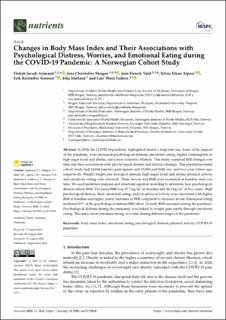Changes in Body Mass Index and Their Associations with Psychological Distress, Worries, and Emotional Eating during the COVID-19 Pandemic: A Norwegian Cohort Study
| dc.contributor.author | Javadi Arjmand, Elaheh | |
| dc.contributor.author | Skogen, Jens Christoffer | |
| dc.contributor.author | Vold, Jørn Henrik | |
| dc.contributor.author | Alpers, Silvia Eiken | |
| dc.contributor.author | Arnesen, Erik Kristoffer | |
| dc.contributor.author | Mæland, Silje | |
| dc.contributor.author | Fadnes, Lars T. | |
| dc.date.accessioned | 2024-02-14T12:05:15Z | |
| dc.date.available | 2024-02-14T12:05:15Z | |
| dc.date.created | 2023-10-27T09:08:49Z | |
| dc.date.issued | 2023 | |
| dc.identifier.issn | 2072-6643 | |
| dc.identifier.uri | https://hdl.handle.net/11250/3117534 | |
| dc.description.abstract | In 2020, the COVID-19 pandemic highlighted obesity’s long-term rise. Some of the impacts of the pandemic were increased psychological distress, emotional eating, higher consumption of high-sugar foods and drinks, and a more sedentary lifestyle. This study examined BMI changes over time and their associations with psychological distress and lifestyle changes. This population-based cohort study had 24,968 baseline participants and 15,904 and 9442 one- and two-year follow-ups, respectively. Weight, height, psychological distress, high-sugar foods and drinks, physical activity, and emotional eating were assessed. These factors and BMI were examined at baseline and over time. We used mediation analyses and structural equation modeling to determine how psychological distress affects BMI. The mean BMI was 25.7 kg/m2 at baseline and 26.2 kg/m2 at two years. High psychological distress, daily emotional eating, and low physical activity were associated with higher BMI at baseline and higher yearly increases in BMI compared to reference levels. Emotional eating mediated 33% of the psychological distress BMI effect. Overall, BMI increased during the pandemic. Psychological distress during the pandemic was linked to weight gain partly through emotional eating. This association remained strong over time during different stages of the pandemic. | en_US |
| dc.language.iso | eng | en_US |
| dc.publisher | MDPI | en_US |
| dc.rights | Navngivelse 4.0 Internasjonal | * |
| dc.rights.uri | http://creativecommons.org/licenses/by/4.0/deed.no | * |
| dc.title | Changes in Body Mass Index and Their Associations with Psychological Distress, Worries, and Emotional Eating during the COVID-19 Pandemic: A Norwegian Cohort Study | en_US |
| dc.type | Journal article | en_US |
| dc.type | Peer reviewed | en_US |
| dc.description.version | publishedVersion | en_US |
| dc.rights.holder | Copyright 2023 The Author(s) | en_US |
| dc.source.articlenumber | 3834 | en_US |
| cristin.ispublished | true | |
| cristin.fulltext | original | |
| cristin.qualitycode | 1 | |
| dc.identifier.doi | 10.3390/nu15173834 | |
| dc.identifier.cristin | 2189032 | |
| dc.source.journal | Nutrients | en_US |
| dc.identifier.citation | Nutrients. 2023, 15 (17), 3834. | en_US |
| dc.source.volume | 15 | en_US |
| dc.source.issue | 17 | en_US |

